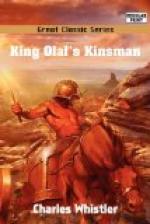“I think men will remember me if I beat Cnut in my own land,” he said lightly. “So I came back as far as the Seine river, and there was Eadward Atheling trying to raise men against Cnut his stepfather. I knew not that that peaceful youth could rage so terribly when occasion was, It was ill to speak of Cnut to him—or of the queen either. Now I spoke with his few thanes, and they held that it was of no use to try to attack England. None would rise to help him. But he begged me to go with him for the sake of old days and common hatred of the Dane. Wherefore I thought that it was as well for England that he learnt his foolishness, and we went together, and were well beaten off from the first place we put into. So he went back contented to try no more, and I put in here on my way homeward.”
Then I said:
“Do you blame me for submitting to Cnut?”
“You could do nought else,” he answered. “And from all I hear he is likely to be a good king. Mind you that vision we saw on the shore in Normandy?”
“It has come to pass as you read it,” I answered.
Then he said:
“Yet more is to come to pass of that vision. Cnut will reign and will pass when his time comes, and with him will pass his kingdoms. There will be none of his line who shall keep them {16}.”
“After him Eadward, therefore, or Alfred, should they live,” I said, musing. For the words of dying Ethelred came back to me—his foretelling of the strong hand followed by the wise.
“That will be seen,” answered Olaf. “Now I came to know if you were yet landless and desperate so that you would sail to Norway with me. But now I cannot ask you that. Nevertheless I shall be more glad to see you wedded and at rest here, for I think that you have seen your share of war.”
“And I have been unlucky therein,” said I.
“Now has your luck changed,” said Olaf. “And all is well.”
So it came to pass that our wedding was made the happier by the presence of Olaf the king and by the songs of Ottar the scald. And Egil came from Colchester, and with him many of those of my men who were left, and Olaf’s ship captains, so that with Sudbury folk and our own people there was a merry gathering enough, and the little church was over full when Ailwin and Oswin were ready at the altar.
After that was over, Olaf came forward and gave to the priests a great chain of gold links, bidding them lay it on the altar for a gift towards rebuilding the house of God.
“Only one thing do I ask you,” he said, speaking in a hushed voice as he stood there. “And that is that no week shall pass without remembrance of those of my men who died for England on Leavenheath.”
And Oswin said:
“It shall be so, King Olaf, for it has already become our custom here. Now will we remember your name also.”
* * * * * *
Ten years agone it is since Olaf sailed away from us and won Norway from the hand of Cnut. Now and then come Norsemen to me from him when they put into Colchester or Maldon, and ever do they bring gifts for Hertha and Olaf and Eadmund and Uldra, the children that are ours. For all things have gone well with us, and with all England under the strong and wise rule of Cnut the king.




